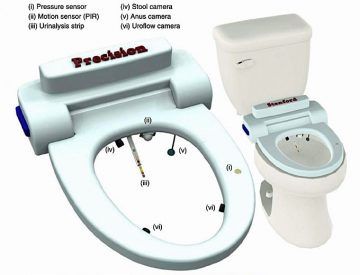Hannah Osbourne in Newsweek:
 A “smart toilet” that can detect disease by collecting data from the urine and feces of a user has been developed by scientists in the U.S. The team, led by researchers at Stanford University, developed a device that can be mounted to a standard toilet that incorporates a number of features, including test strips and video cameras, to analyze features of a person’s bodily waste. Details of the smart toilet have been published in Nature Biomedical Engineering. The team hopes their smart toilet could lead to disease prevention and prediction, by monitoring the user’s health and flag any anomalies as and when they may arise. Diseases that could be targeted include colorectal and urological cancers. Smart devices to aid with disease prevention and detection are becoming increasingly prevalent and the market is moving quickly.
A “smart toilet” that can detect disease by collecting data from the urine and feces of a user has been developed by scientists in the U.S. The team, led by researchers at Stanford University, developed a device that can be mounted to a standard toilet that incorporates a number of features, including test strips and video cameras, to analyze features of a person’s bodily waste. Details of the smart toilet have been published in Nature Biomedical Engineering. The team hopes their smart toilet could lead to disease prevention and prediction, by monitoring the user’s health and flag any anomalies as and when they may arise. Diseases that could be targeted include colorectal and urological cancers. Smart devices to aid with disease prevention and detection are becoming increasingly prevalent and the market is moving quickly.
In February, a global initiative was launched by researchers in the U.K. to harness wearables in a bid to find “fingerprints” of neurological diseases like Alzeheimer’s. By using digital health technology, the team hopes to identify people at most risk of these diseases improving early detection rates. Last month, research published in the Journal of the American College of Cardiology found mobile health devices, such as fitness trackers, smart watches and mobile phones, could be used to screen for and detect people with atrial fibrillation, which can cause an irregular heart rate. The idea of a smart toilet being used to monitor health is not new. Japanese firm Toto developed a toilet that could measure urinary sugar and hormone levels as far back as the early 2000s, but demand for the product was low. Last March, researchers at the Rochester Institute of Technology announced they had developed a toilet-based cardiovascular monitoring system. The toilet seat can measure things like heart rate and blood pressure. The seat could be given to people with congestive heart failure, and the data could be analyzed so if a person’s condition is deteriorating, health providers can be alerted.
The latest design goes further than other smart toilet designs as it collects data from a person’s urine and feces through a variety of gadgets. “Our concept dates back well over 15 years,” Sanjiv Gambhir, professor and chair of radiology at Stanford, and corresponding author on the Nature study, said in a statement. The team has now completed a pilot study of 21 participants. A user is identified by the smart toilet by fingerprint recognition on the flush, and a camera inside that can identify “the distinctive features of their anoderm.” Gambhir explained: “The whole point is to provide precise, individualized health feedback, so we needed to make sure the toilet could discern between users. We know it seems weird, but as it turns out, your anal print is unique.”
More here.
